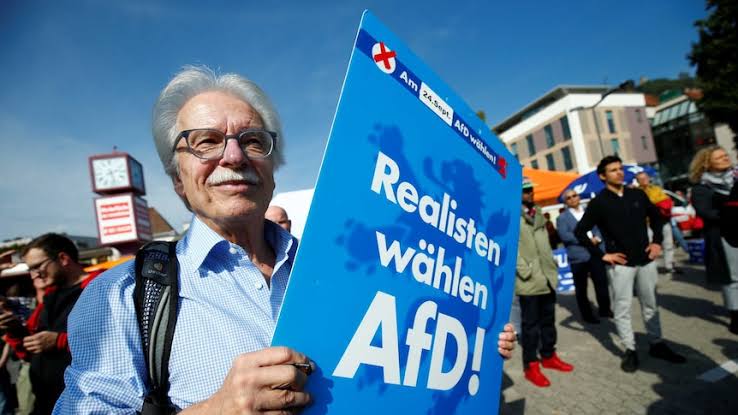AfD surges to the top of German opinion polls, shaking the political establishment

By Jennifer Hicks
In a historic first for Germany’s political landscape, the right-wing Alternative for Germany (AfD) party has topped a major nationwide opinion poll, signaling a growing appetite for political change among German voters and escalating the pressure on mainstream parties struggling to form a new government.
According to a new Ipsos survey released on April 9, the AfD has garnered 25% support among eligible voters-outpacing the long-dominant center-right Christian Democratic Union (CDU) and its Bavarian sister party, the Christian Social Union (CSU), which together received 24%.
The poll, conducted on April 4 and 5 with a sample size of 1,000 respondents, marks the first time the AfD has ranked as the most popular party in Germany since its founding in 2013.
Compared to the previous Ipsos survey in early March, the AfD has gained three percentage points, while support for the CDU/CSU alliance dropped by five.
Chancellor Olaf Scholz’s Social Democrats (SPD) held steady at 15%, and the Greens slid to 11%, now tied with the resurgent Left Party, which gained two points to reach its highest standing since 2016.
The reaction from the AfD was celebratory. Party co-leader Alice Weidel posted on X (formerly Twitter), “For the first time in the AfD’s short history, we are the strongest party in Germany… Citizens want political change – not a ‘business as usual’ coalition between the CDU/CSU and SPD!”
Weidel’s statement reflects a growing sense of disenchantment with the political establishment. Her party’s rise comes amid ongoing coalition negotiations following the February federal election, where CDU/CSU won the largest share of votes at 28.5% but failed to secure an outright majority.
The AfD came in second with 20.8%, more than doubling its 2021 election result of 10.4%-a stunning leap for a party routinely dismissed by mainstream politicians as unelectable.
The post-election negotiations have dragged on, with CDU leader Friedrich Merz-widely seen as the next chancellor-currently in talks with the SPD to form a centrist coalition.
The two parties are reportedly ironing out differences on contentious issues such as migration, climate policy, and Germany’s position within the European Union.
Despite the SPD’s historic loss at the polls, securing just 16.4% of the vote, the alliance between the CDU and SPD is likely to command a comfortable majority in the Bundestag with 328 seats, well above the 316 needed to govern.
However, this coalition, which some have dubbed a “marriage of necessity,” appears to have little public enthusiasm. Political analysts argue that the surge in AfD’s popularity is directly linked to voter frustration over the slow coalition talks and what is seen as an increasingly insular political class disconnected from public concerns.
“This survey clearly shows that people are becoming increasingly impatient,” said political scientist Volker Kronenberg in an interview with Die Welt.
“They want concrete negotiation results. They want to know what is coming their way.”Kronenberg’s comments underscore a broader malaise that has gripped the German electorate.
The cost-of-living crisis, perceived policy inertia, rising immigration, and disillusionment with Brussels have all played into the AfD’s populist message. The party’s hardline stance on immigration, its skepticism toward the EU, and its criticism of Germany’s support for NATO have resonated with large segments of the population-particularly in the eastern states, where the AfD enjoys strong support.
Yet, despite its popularity, the AfD remains politically isolated. All major parties have enacted an informal “firewall” against the group, refusing to work with it under any circumstances. Friedrich Merz reiterated this stance in March, saying, “The AfD stands against our Western orientation, the euro, and NATO. There will be no cooperation.”
This cordon sanitaire has left the AfD unable to translate its electoral gains into governing power. Critics argue that this strategy has only strengthened the AfD’s narrative of being the sole opposition to a self-serving political elite.
The party has also weathered scandals involving members accused of making revisionist comments about Germany’s Nazi past and remains under surveillance by the Federal Office for the Protection of the Constitution for suspected links to extremism.
The AfD, for its part, denies all allegations of being far-right and insists it is defending the national interest.
Despite the controversy, the AfD’s appeal continues to rise, especially among younger voters disenchanted with the conventional left-right political binary.
The party’s success reflects not just dissatisfaction with individual politicians but a structural crisis within Germany’s post-war consensus politics.
The CDU’s attempts to reassert its dominance have also faltered. While Merz has presented himself as a pragmatic and stable alternative to Scholz’s beleaguered chancellorship, his decision to court the SPD has drawn criticism from both the right and left.
Many conservative voters feel alienated by what they see as a return to centrist “grand coalitions” that prioritize consensus over bold reform.
Others argue that this strategy ignores the underlying demand for political realignment reflected in the AfD’s rise.
Meanwhile, the Greens, once seen as the natural inheritor of progressive momentum, have seen their support erode amid internal divisions and public skepticism toward their environmental agenda, especially in the wake of economic challenges and energy uncertainty.
What happens next will test Germany’s political resilience. If Merz is able to form a stable government with the SPD by his self-imposed Easter deadline of April 20, he may be able to contain the AfD’s momentum in the short term.
However, if the new coalition fails to address pressing public concerns—particularly on migration, inflation, and national identity-the AfD’s rise could signal the beginning of a deeper realignment in German politics.
Germany, long seen as a bastion of centrist stability in Europe, is now confronting a political landscape where the unthinkable-the ascendancy of a once-fringe populist party-is becoming an undeniable reality.
Whether the political establishment chooses to engage with this shift or continue to isolate it may well determine the country’s democratic trajectory for years to come.




